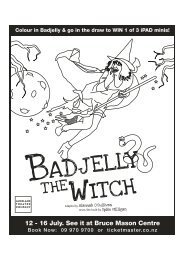Anne - Auckland Theatre Company
Anne - Auckland Theatre Company
Anne - Auckland Theatre Company
Create successful ePaper yourself
Turn your PDF publications into a flip-book with our unique Google optimized e-Paper software.
is, however, a verse in the OldTestament Book of Leviticus(20:21): "If a man shall take hisbrother's wife, it is an uncleanthing: he hath uncovered hisbrother's nakedness: they shallbe childless." Henry, to thealarm of the diehard CatholicThomas More but encouragedby the closet Protestant ThomasCranmer, argued that this versemeant that, in the eye of God,he should never have marriedCatherine because she was firstmarried to his elder brother,Arthur. Catherine, herself a greatpolitical infighter – these peoplewere extraordinarily tough –countered that she and Arthurhad never consummated theirmarriage.Cardinal Wolsey, Henry'schancellor, did his best withLeviticus but the pope washaving none of it. Complex andfrustrating negotiations peteredout. For his own political reasons– Catherine's nephew hadrecently sacked Rome and hewas terrified of her family – PopeClement forbade the divorce.The church's word was final.<strong>Anne</strong> BoleynBut the cannon had fired – the king had made uphis mind – and there must be a divorce. Wolsey fell,Cromwell became chancellor and the Protestants'moment had come in England. The word ofscripture, not the command of the Catholic church,would rule the king.When Dominic Dromgole, the artistic director ofShakespeare's Globe <strong>Theatre</strong>, asked me to write aplay about the translating of the King James Bible Icouldn't see how to do it. But I had long wanted towrite about the Tudors – I once had a crazy idea fora play called Tudor Rose in which one actor wouldplay all the monarchs, Henry VII to Elizabeth. ThenI remembered reading that <strong>Anne</strong> Boleyn owned acopy of Tyndale's translation of the New Testament.She also had got hold of a copy of his incendiaryThe Obedience of a Christian Man, published in1528. This was a key text of the Reformation; itattacked the Catholic church and argued that kings,like all of us, are responsible directly to God whospeaks to us through scripture, not through thechurch or the pope. Wolsey, forever trying to stemthe Protestant tide, confiscated the book from oneof <strong>Anne</strong>'s ladies-in-waiting. <strong>Anne</strong> went at once tothe king and Wolsey was forced to return it. Shemarked up passages for Henry and gave it to him.He famously commented: "This book is for me andfor all kings to read." The word had wormed its wayinto the king's head.And I had another crazy idea: what if when Jamesascends the English throne in 1603 he is lookingthrough Queen Elizabeth's effects and, hidden in anold chest, he finds her mother's copies of Tyndale'sbooks and becomes obsessed with her?After Henry the country Catholic and Protestantmartyrs burnt. Elizabeth tried to damp downcontroversy but failed. James was faced with adangerous schism between "high church" – whoseadherents longed for the old Catholic glories andhierarchies – and "low church", where worshipperswanted to be like the early Christian communitieswhich had no bishops at their head, just Christ andhis word.James saw where this could lead: a challenge tothe authority of the throne itself, the divine rightWilliam Tyndaleto rule. He called a conferenceat Hampton Court to settle thecontroversy. The exchangesbetween the divines and theirking are a dramatist's sweetshop;James was a brilliant, savagedebater with a scabrous witthat stunned the assembly. Theidea for a new translation camefrom a moderate Puritan scholarfrom Oxford, John Reynolds.Immediately James saw theopportunity: a new Bible couldunite the Protestant factionsin agreement. He set up manycommittees of translatorsfrom all sides. The King JamesBible was a brilliant, inventivepolitical manoeuvre. The textwas largely based on Tyndale'stranslation subtly amended toenhance the authority of thestate and downgrade personalfaith (Tyndale's "congregation"became "church", "elder" became"priest" and "love" became"charity".) Now controversy couldend. The word of God was clearfor all to read.James's settlement failed. TheProtestant revolution that beganin Henry's time exploded intothe English civil wars of 1642 to 1649. What Jamesfeared came to pass: monarchy's divine power wasbroken forever.For there is a deadly fault-line in the Protestantdependence on the word. My father and the butcherwere standing on it: it is interpretation. Tyndale'sbook gave Henry the intellectual authority to breakwith Rome. But in a virulent pamphlet, The Practiceof Prelates, Tyndale attacked Henry's desire for adivorce quoting the Book of Deuteronomy (25:2): "Ifbrethren dwell together, and one of them die, andhave no child. The wife of the dead shall not marrywithout unto a stranger but her brother's husbandshall go unto her." But which is true, Leviticus orDeuteronomy? Is God contradicting himself?<strong>Anne</strong> Boleyn and Tyndale never met but in myplay they do (it's what playwrights call "the Schillermanoeuvre", after the great scene in MARIA STUARTwhere Elizabeth I meets Mary Queen of Scots). <strong>Anne</strong>challenges him: which of the two verses is God'sword? Tyndale replies that Leviticus refers to takinga brother's wife when the brother is still living.ANNE: Nowhere does it say that!TYNDALE: That is the revealed meaning.ANNE: Revealed how?TYNDALE: By prayer.ANNE: Oh, then let's pray and make anything true!This is the tyranny of the word of God. It is meant tofree you. But interpret it wrongly – that is against theinterpretation of the men with swords or guns – andit can kill.(Printed with permission of The Guardian)22 23
















